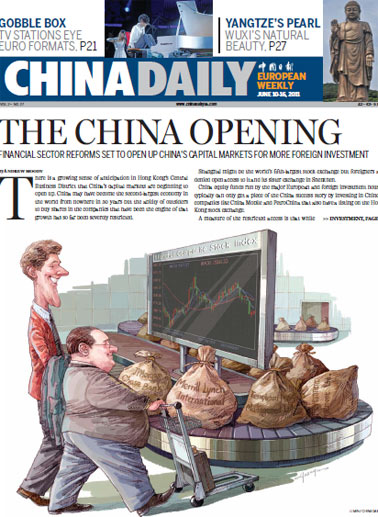Big ticket brands get ready for date with bourses
Updated: 2011-06-10 10:25
By Andrew Moody (China Daily European Weekly)
Foreign companies such as soft-drinks giant Coca-Cola Co and Unilever Plc, the UK consumer brands conglomerate, may get the go ahead to list on the Chinese stock exchanges within the next few days.
There is speculation that Beijing is set to announce plans for an international board on the Shanghai Stock Exchange by the end of this month.
Any such move would be a key stage in the opening up of China's capital markets to the rest of the world.
Daryl Guppy, the independent technical analyst and financial author who is a close observer of China markets, says China listings could have major significance.
"It is a massive development. With the China market you have two situations right now. You have foreign companies hammering on the door trying to get access to Chinese capital and investors wanting to buy into Chinese companies," he says.
One of the main ways of getting access to Chinese capital for foreign firms has been to issue yuan-denominated bonds.
Both McDonald's and Unilever have issued such bonds over the past year. Companies taking this course still have the problem of taking the proceeds of such sales into China in order to fund any expansion.
Guppy says listings on the China bourses would end the problem Chinese investors currently have of having to take their money offshore in order to invest in foreign companies.
"In the past that capital has had to come out of the Chinese mainland to go to the United States, Australia or elsewhere, but now if these companies are allowed to list in Shanghai or Shenzhen it is going to give domestic investors easy access to big name foreign companies," he says.
Major European and other foreign companies would not only see listing in China as a way of accessing finance to expand in the country but also to raise the profile of their brands.
Italian luxury goods group Prada is set to list in Hong Kong, as well as British company Burberry and luggage maker Samsonite, now owned by Luxembourg-based CVC and Royal Bank of Scotland.
Rob Ebert, head of Asia-Pacific sales at Deutsche Bank in Hong Kong, says such listings will help develop their profile in Asia.
"I think from a brand recognition view it is vital the big brands list on the exchanges here, whether it is in Hong Kong or on the mainland ones themselves," he adds.
Guppy says that if the Shanghai and Shenzhen bourses do open up to foreign companies, there will be some concerns that they might divert funds away from domestic businesses.
"It is going to have a liquidity impact on Shanghai and Shenzhen because it will suck some of the equity out of the domestic market," he says.
He adds the foreign companies would be more favorably placed to finance their expansion plans on the mainland.
"It will enable them to easily tap into Chinese capital and establish a longer term presence in China," he says.
E-paper

Harbin-ger of change
Old industrial center looks to innovation to move up the value chain
Preview of the coming issue
Chemical attraction
The reel Mao
Specials

Vice-President visits Italy
The visit is expected to lend new impetus to Sino-Italian relations.

Birthday a new 'starting point'
China's national English language newspaper aims for a top-notch international all-media group.

Sky is the limit
Chinese tycoon conjures up green dreams in Europe with solar panels
